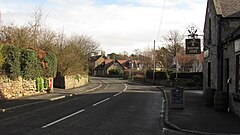Fountainhall
| Pencaitland | |
|---|---|
 Winton Arms, Pencaitland |
|
| Pencaitland shown within East Lothian | |
| Population | 1,671 |
| OS grid reference | NT443690 |
| Civil parish |
|
| Council area | |
| Lieutenancy area | |
| Country | Scotland |
| Sovereign state | United Kingdom |
| Post town | TRANENT |
| Postcode district | EH34 |
| Dialling code | 01875 |
| Police | Scottish |
| Fire | Scottish |
| Ambulance | Scottish |
| EU Parliament | Scotland |
| UK Parliament | |
| Scottish Parliament | |
Pencaitland is a village in East Lothian, Scotland, about 12 miles (19 km) south-east of Edinburgh, 5 miles (8.0 km) south-west of Haddington, and 1 mile (1.6 km) east of Ormiston.
The land where the village lies is said to have been granted by William the Lion to Calum Cormack in 1169, who gave the church, with the tithes and other property belonging to it, to the monks of Kelso, in whose possession it remained till a short time prior to the accession of Robert Bruce. The land subsequently became the property of a younger branch of the Maxwell family, who granted the advowson and tithes to the monks of Dryburgh Abbey, who held them until the Reformation.
The Tyne Water divides the village into Easter Pencaitland and Wester Pencaitland, crossed by a three-arched bridge dating from the 16th Century. An ancient cross in Wester Pencaitland indicates that there would probably have been a market there. A large industrial maltings, which was built in 1965, is situated just before the entrance to the village at Wester Pencaitland.
The name "Pencaitland" may derive from the Old Brythonic meaning "Head of the Woodland"
Pencaitland Community Council meets 10 times throughout the year, typically on the last Wednesday of the month at the Trevelyan Hall in Wester Pencaitland. The Community Council is constituted from 15 members of the local population along with the locally elected representatives of the Fa'side catchment. This catchment extends to New Winton and Boggs Holdings to the north and Peastonbank to the south.
0.5 miles (800 m) north-west of Pencaitland is Winton House, the original square Tower house being built in the 15th century on land granted to the Setons by David I c1152, and mentioned in a charter to them from William the Lion in 1169. It was burnt by the Earl of Hertford's forces during the Rough Wooing, and subsequently repaired, restored, and later enlarged by George Seton, 3rd Earl of Winton, commencing in 1619. Architecturally, Winton is one of the most important houses in Scotland, due largely to the work of William Wallace, who was appointed the King's Master Mason in 1617.
...
Wikipedia

